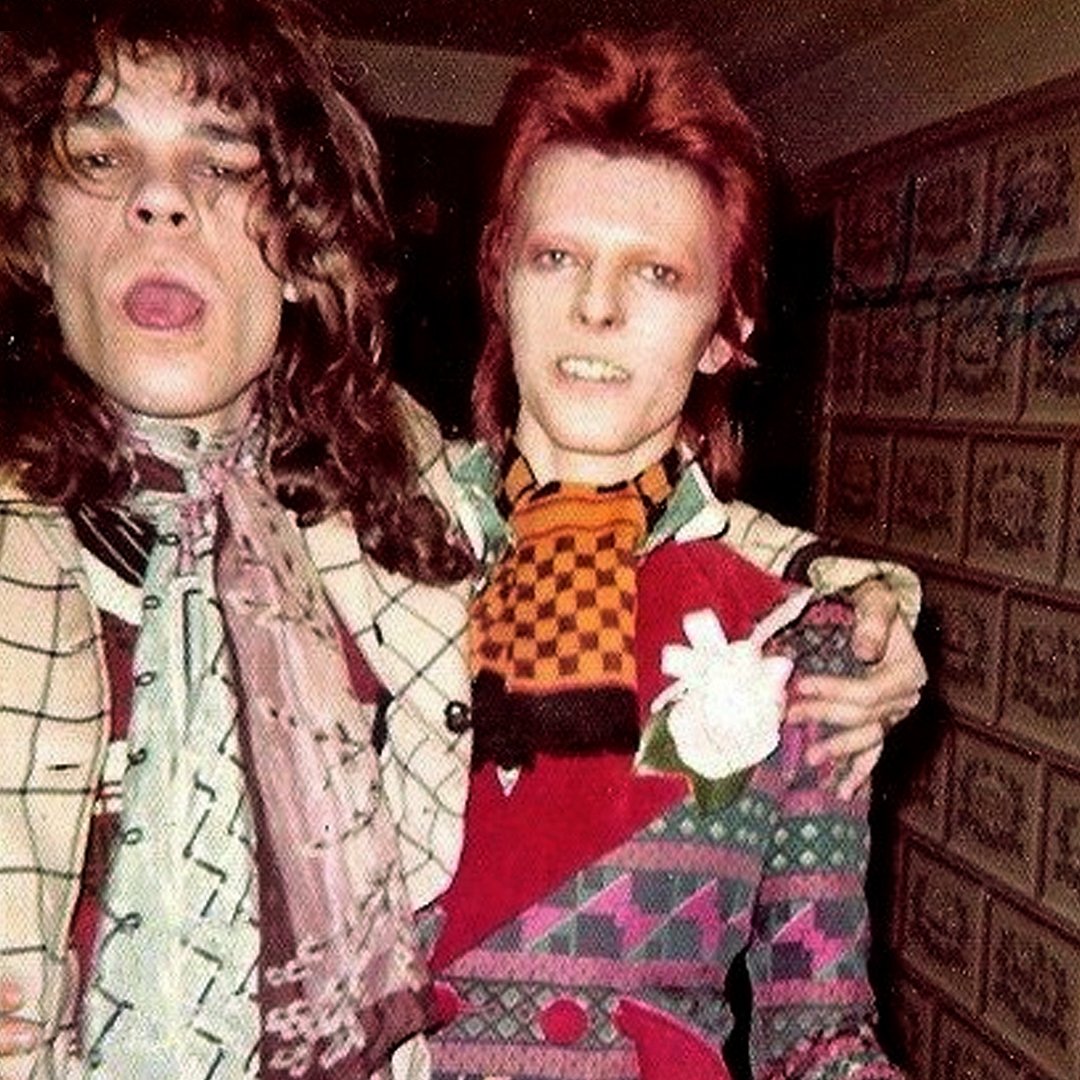‘Tonight’: How Iggy Pop’s Meditation On Mortality Became David Bowie’s Swansong For Doomed Lovers
Originally recorded for Iggy Pop’s Lust for Life album, ‘Tonight’ would unite David Bowie and Tina Turner on record in the mid-1980s.
By Jason Draper
+ - + - + - + - + - + - + - + - + - + - + - + - +
When David Bowie and Iggy Pop made their second trip together to Berlin, in April 1977, they sought to continue the rehabilitative lifestyle they’d embarked upon the previous year, while also building on the creative partnership that had seen Bowie help the former Stooges frontman establish himself as a solo artist. Just as the recording of Pop’s debut album, The Idiot, was followed swiftly by sessions for Bowie’s Low, at the famed Château d’Hérouville facilities, in a village in the north of France, Pop’s follow-up record, Lust for Life, provided a warm-up of sorts for Bowie’s “Heroes”, recorded in the fresh surroundings of Hansa Tonstudio, in West Berlin.
Worked up during Pop’s first solo tour, and completed during the Lust for Life sessions, was a song called ‘Tonight’, in which Pop reflected on one of the more desperate passages in a life lived on the edge following the implosion of his first band. One of many Pop co-writes that Bowie would return to later in his career, the song would be given a very different interpretation by Bowie when he re-recorded it as a duet with Tina Turner. That version, which would lend its name to Bowie’s 1984 album, would be received by Rolling Stone magazine as “one of the most vibrantly beautiful tracks he’s ever recorded”. But before that, ‘Tonight’ took listeners on a trip into Pop’s darker past, on an album which Bowie described as being “far more like the old Iggy than anything he’s done for a long time”.
Iggy Pop’s version: “This is a song about my girlfriend, who’s dead”
Recorded in the summer of 1976, Pop’s debut album, The Idiot, was finally released the following March, a little under three weeks into a tour Pop had launched to promote the record. For Pop’s solo shows, Bowie, who’d been instrumental in revitalising his friend’s career, first as producer of The Stooges’ third album, 1973’s Raw Power, and now as creative lead on The Idiot, cheerfully settled into the role of sideman, providing keyboard and backing vocals as part of a group that also included Low guitarist Ricky Gardiner and the straight-up rock’n’roll rhythm section of sibling duo Tony (bass) and Hunt (drums) Sales.
Looking healthier than he had in years, Pop confidently mixed Stooges classics with highlights from The Idiot, and even previewed ‘Tonight’ during some of the tour’s early shows. “This is a song about my girlfriend, who’s dead!” he told a hometown Detroit crowd on 25 March, before the wailing vocals of Bowie and the Sales brothers set the scene for Pop’s startling declaration: “I saw my baby/She was turning blue/I knew that soon, her young life was through/And so I got on my knees/Down by her bed/And these are the words/To her I said…”
As the Sales clattered into action and Bowie added elegiac keyboard lines on top, Pop moved from despairing bellow to his newly developed croon, seeking to console his doomed lover – and possibly also himself – with the assertion that “everything will be alright tonight”.
Having been honed on the road, ‘Tonight’ was quickly captured on tape in Hansa, where Bowie, Pop and their crew settled after finishing the tour in April. Again, Bowie was content to play support, reprising his role as backing vocalist during the wordless intro, and harmonising with Pop’s alternately anguished and imploring vocals on a recording that finds a meeting point between the loose-limbed rock instincts of Pop’s rhythm section and the considered New Wave of Bowie’s Low and “Heroes” aesthetic. For his part, Pop pulled round-the-clock shifts in order to outpace his creative partner and reach this balance. “During that album, the band and Bowie’d leave the studios to go to sleep, but not me,” he admitted. “I was working to be one jump ahead of them for the next day… See, Bowie’s a hell of a fast guy. Quick, quick. Very quick thinker, very quick action, very active person, very sharp. I realised that I had to be quicker than him, otherwise whose album was it gonna be?”
David Bowie’s version: “I really wanted to work with Iggy again”
From its stark description of a fatal overdose to its resigned acceptance of the dangers of drug use, there was no mistaking that ‘Tonight’ was the work of Iggy Pop. “It’s out of that specific area that I’m not at home in,” Bowie would tell NME, shortly after recording his own version of the song. “I can’t say that it’s Iggy’s world, but it’s far more of Iggy’s observation than mine.” And yet, seven years on from the Lust for Life sessions, Bowie had sought to bridge those two worlds when he recorded the follow-up to his gargantuan Let’s Dance album.
“What I suppose I really wanted to do was to work with Iggy again,” he explained, while also acknowledging that, without having too much new material to hand, he appreciated taking “a chance, like Pin Ups did a few years ago, to do some covers that I always wanted to do”. Indeed, five of Tonight’s nine songs would be covers, and, of those, three would be Pop co-writes, with Pop also receiving a credit on two of the album’s original numbers, ‘Tumble and Twirl’ and ‘Dancing with the Big Boys’.
A new approach: “I guess we changed the whole sentiment around”
Years later, Pop would call Bowie “a benefactor” who “went a bit out of his way to bestow some good karma on me”, and Bowie’s decision to include so many Pop co-writes on Tonight has been seen as an attempt to shore up some funding for Pop at a time when his career had hit a low point. Travelling companions once again, Bowie and Pop had spent time together in Bali and Java ahead of sessions for what would become Tonight, and Pop was only too happy to see what happened when they decamped to Le Studio, in Morin-Heights, Quebec, to begin work on the album. Fired up by the return of his old creative foil, Bowie recorded a reggae-fied version of ‘Tonight’, complete with marimba solo by Guy St. Onge, in a nod to the gamelan music that had captivated him while travelling through Indonesia.
In a collaborative mood, Bowie also extended an invitation to Tina Turner, whose presence would make for another radical alteration to this new version of ‘Tonight’. Now framed as a duet between lovers, the song could be heard as a cautious plea for reconciliation as much as it was a reckoning with mortality – an interpretation encouraged by Bowie’s decision to remove Pop’s opening pronouncement from his version. “That was such an idiosyncratic thing of [Iggy’s] that it seemed not part of my vocabulary,” Bowie told NME. Adding that he didn’t want to “inflict” the original overdose narrative on Turner, he noted, “I guess we changed the whole sentiment around. It still has that same barren feeling, though.”
Issued as a single on 26 November 1984, two months on from the release of its parent album, ‘Tonight’ was singled out for particular praise by Rolling Stone’s Kurt Loder, who, in his review of the album, called the song “an inspired and blessedly spare reworking of an old Iggy-and-Ziggy collaboration” on which Turner provided “grit and sinew” as a counterpart to one of the “sweetest and most human” vocals of Bowie’s career.
The live duet: “Says everything about our feelings together”
Bowie had been thrilled to have Turner guest on his album. “As iconic as he is, he wanted this to be an amazing experience for her,” Carlos Alomar, who’d played guitar on both the Lust for Life and Tonight versions of the songs, later told Uncut magazine. Joining Bowie and Turner for dinner after the recording, Alomar and his wife, Robin Clark, would note that Bowie “wanted all things covered. ‘Let there be no stone unturned to make this woman feel at home.’”
Bowie had long been a fan of Turner: the powerhouse performer on vintage soul hits such as ‘River Deep – Mountain High’ and ‘Proud Mary’ was, he’d told Capitol Records execs, his “favourite singer”, an appraisal that all but led a stampede of label heads to see her perform at New York City’s Ritz club in early 1983. Turner would forever consider Bowie’s support to have been “very special and significant”, and the reason that she got a record deal at a make-or-break stage in her career. She would acknowledge her return respect by recording one of Bowie’s Diamond Dogs songs, ‘1984’, for Private Dancer.
It was ‘Tonight’, however, which “says everything about our feelings for each other”, Turner later wrote in her memoir My Love Story. At an arena-filling peak of her own in 1985, Turner invited Bowie on stage to perform the song with her during her two-night residency at Birmingham’s National Exhibition Centre, across 23 and 24 March, as she rode the unstoppable wave of Private Dancer’s success. Released on the Tina Live: Private Dancer Tour video, the 23 March performance, which was followed by a jubilant run through Bowie’s ‘Let’s Dance’, made clear the close bond that had formed between the two stars – not least when Bowie, looking, in his white tuxedo, every inch the elegant suitor to Turner’s leather-clad rock siren, leaned in mid-song to whisper something that made Turner howl with laughter. “They got on really well; they were very comfortable with each other,” Paul Cox, Turner’s photographer on the tour, told this writer for the liner notes to the 40th-anniversary deluxe-edition reissue of Private Dancer. “Her energy was such that all those people looked at her and went, ‘I want to be a part of that.’ She always pulled people along.”
For Turner, the feeling was mutual. “He’s got so much knowledge,” she would say of Bowie. “He really is like the man who fell to Earth, for me. You can’t put your finger on David… I’ll be ever thankful to him.”
Buy the ‘Private Dancer’ 40th-anniversary deluxe-edition reissue.







